In with the Boat Club as they prepare for Head of the River
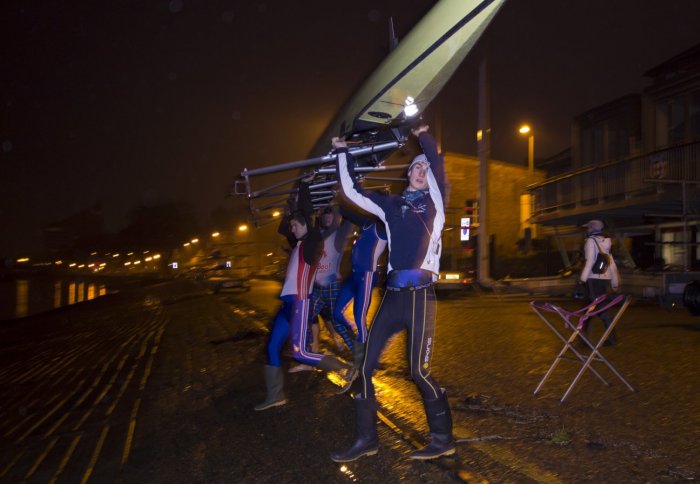
We attend an early morning practice at the Imperial College Boat Club, as rowers are preparing for the upcoming Head of the River race.
It’s 05.45 on a particularly cold morning in late February and the sky shows no sign of dawn as my taxi pulls up to the Imperial Boathouse. Bleary-eyed, I enter to find more than 30 Imperial students sitting on the floor of the gym, already alert and formed in teams of eight. In 10 minutes they would be out on the water for their regular Tuesday practice.
Head of Rowing Don McLachlan, dressed in a warm jacket and gloves, leads the first and second men’s eight down to the waterfront to put them through their paces. Crews lift the boats into the water and paddle upstream towards Chiswick hugging the bank as they row against the ebbing tide – lit only by small lights on the bow.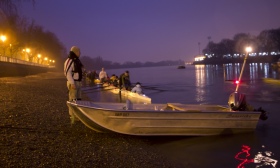
The air is heavy with mist and a light, freezing rain. “The weather’s been worse than this,” says Don, “but when you’re on the water, the temperature drops by two or three degrees, and then you really feel it”.
At this time of year, the teams are focusing on developing their endurance by training in intensive 20-minute sections. Many of the upcoming tournaments are time-trial processional races up to 7km; much longer courses than the regattas of the summer. The largest competition of its kind is the Head of the River race on 23 March, which is contested over 6.8 kilometres between Chiswick Bridge and Putney.
A few minutes into a long piece your body is in searing pain. You need to find the strength and the discipline to push through that
– Don McLachlan
Head of Rowing
Five hundred teams from across Europe compete in the men’s Head, which aside from Henley Regatta, is the most important men’s race in the British rowing calendar. In the Head race, teams start in single file, the order determined by finish places the previous year.
Races like the Head require the strength endurance to last the course at maximum effort. Don says: “A few minutes into a long piece your body is in searing pain. You need to find the strength and the discipline to push through that. You need a lot of determination to push your body and find its limit.”
The competitive edge
Back on the Thames, halfway through the 20-minute set piece, the boats cross the river and push on into a side-by-side race. The second team, taking the inside, has the advantage of a faster section of water, and both teams fight hard for pole position in order to make the tightest turn at the next buoy.
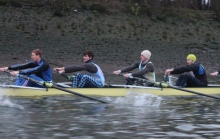 The first team, edging forward, takes a sharp line across the second team’s bow, and with oar-tips only centimetres apart, pulls hard towards the buoy. Their tactics pay off and they are through the buoy in the lead.
The first team, edging forward, takes a sharp line across the second team’s bow, and with oar-tips only centimetres apart, pulls hard towards the buoy. Their tactics pay off and they are through the buoy in the lead.
As the crews enter the final minutes of the set, the first eight ups its game, quickly opening up a sizeable lead, to the approval of Don.
“They [the first eight] aren’t going to outmuscle every crew, but they can outrow them. They just have to hang tough mentally”, he says.
The mental challenge of the sport was echoed by fellow coach Stuart 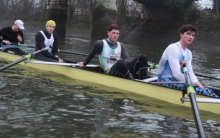 Whitelaw. “In rowing you’re facing away from the direction of travel unlike say running, so it becomes a psychological game. It only takes one rower to lose their nerve. It’s like a dance – if one person steps out, or gets too excited, then you completely lose momentum.”
Whitelaw. “In rowing you’re facing away from the direction of travel unlike say running, so it becomes a psychological game. It only takes one rower to lose their nerve. It’s like a dance – if one person steps out, or gets too excited, then you completely lose momentum.”
Success against the odds
Rowing is without question one of the jewels in Imperial’s sporting crown. The Club’s heyday in the 1990s reached its peak at the Sydney Olympic in 2000 when an incredible three of the gold medal winning eight hailed from the Imperial Boathouse. Since then the Club has grown to its current size of 100 members, including a handful of elite level athletes among their number.
The Club has reason to be proud of its recent efforts in university and mainstream competition. Last year saw Melanie Wilson (Medicine) row for Team GB in the Olympics, and this year the men’s first eight have maintained a perfect record of wins across UK and international events so far this season. And earlier this month the women’s first eight secured victory in their Head of the River Race, coming home 16 seconds ahead of the second place finishers.
“Looking back over the years, many Imperial rowers have gone on to particularly successful careers and I think that’s because our members are generally very well-rounded individuals.
– Stuart Whitelaw
High performance coach
Attaining this level of sporting achievement is all the more admirable as rowing must fit around the demands of an Imperial degree. The rowers must become excellent multi-taskers in order to manage the hours of study and lab time, the intensive examination periods and the training regime.
Coach Stuart says: “Looking back over the years, many Imperial rowers have gone on to particularly successful careers and I think that’s because our members are generally very well-rounded individuals. Some come in a bit rough around the edges but we soon smooth them out!”
Imperial students don’t always have the advantage of a typical rowing physique either, according to Paddy Hudson, who rows in the men’s first eight and also does some coaching. He explained, “We are quite different from other universities that are entirely sports-focused. They generally draw upon a pool of very tall, elite athletes, whereas at Imperial there are people like me – 5ft 10” computer scientists. Yet we are right up there with the best, thanks to the dedication, team spirit and the facilities and coaching.”
It’s not just the students that have a tough schedule. Don and Stuart’s regime of training and fixtures often commits them to 80-hour weeks, and every bit of spare time at the weekend. Rowing isn’t a job; for Don, Stu and the rest of Imperial Boat Club it’s a way of life. And Don’s schedule is unlikely to become less demanding, as he will soon be leaving Imperial to take up a new post, coaching Team Ireland in preparation for Rio 2016.
Full commitment
As students inevitably graduate and move on, the Club has a natural 3–6 year turnover of members, so the coaches have to move fast to spot talented students and develop their strength and stamina ready for competition.
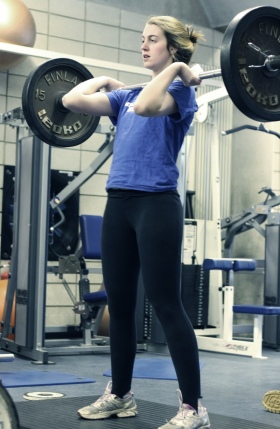 The training programme includes gym sessions morning and night, weights twice a week, and long rows on Tuesday, Thursday, Saturday and Sunday, interspersed with evening work on the rowing machines.
The training programme includes gym sessions morning and night, weights twice a week, and long rows on Tuesday, Thursday, Saturday and Sunday, interspersed with evening work on the rowing machines.
Tom Jones started rowing in October, and has already competed in two races. Describing the training regime, he says: “If last year you’d have told me I’d have been up at 05.00 to do a double training session before uni, I’d have laughed at you, but now that’s just what I do. I love the training. Everyone is constantly seeing how far they can go beyond the limit and everyone is fully committed to rowing – it’s infectious.
Support the Boat Club on 23 March
Due to adverse weather conditions the men's Head of the River race scheduled for 23 March was cancelled. Sophie Clarke-Hackston, Boathouse Manager, encourages staff, students and alumni to support the Imperial crews at future competitions this summer: the Henley Royal Regatta takes place from 3 – 7 July 2013. Find out more at: http://www.hrr.co.uk/
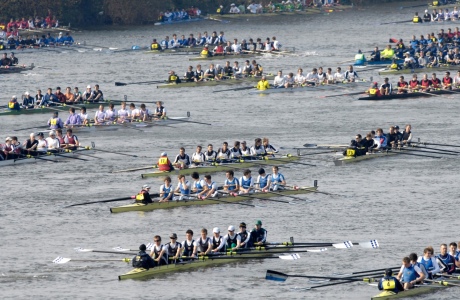
Image: Peter Spurrier
Article text (excluding photos or graphics) © Imperial College London.
Photos and graphics subject to third party copyright used with permission or © Imperial College London.
Reporter
Press Office
Communications and Public Affairs
- Email: press.office@imperial.ac.uk
